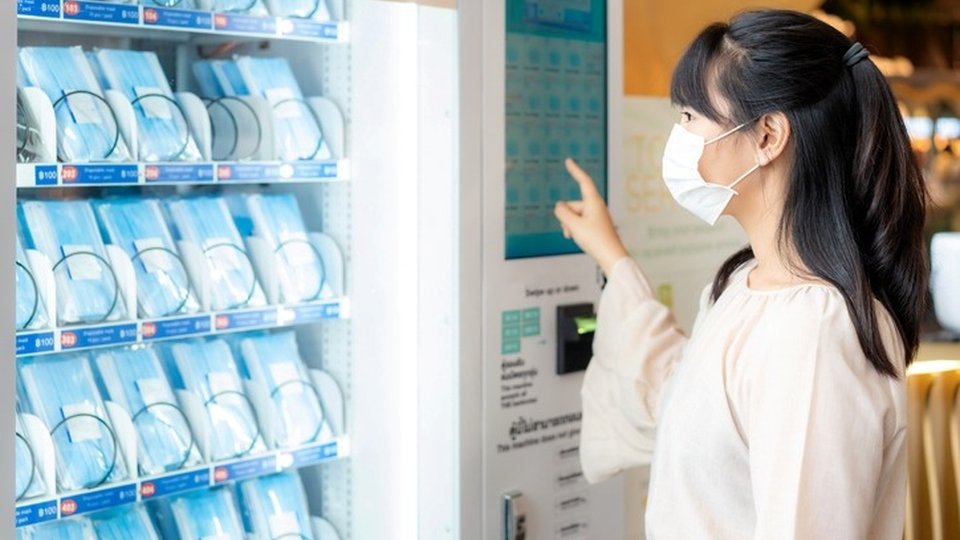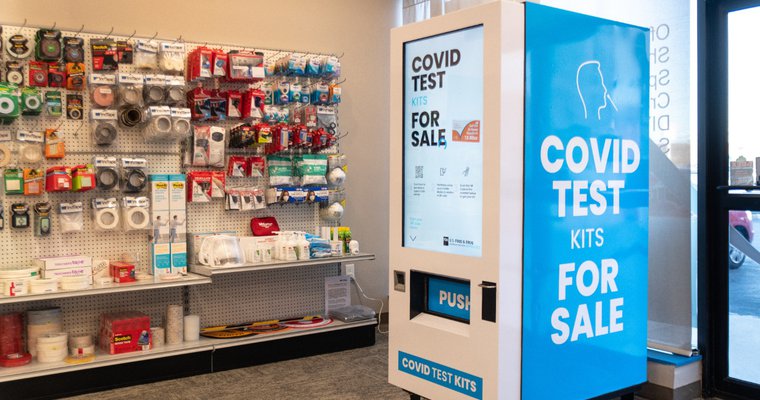Customer Experience
PPE surge abates as pandemic softens, but health supply kiosks find a niche
While the demand for PPE kiosks has lessened since the start of the pandemic, it has not disappeared and is not expected to.

April 4, 2022 by Elliot Maras — Editor, Kiosk Marketplace & Vending Times
As businesses and organizations began to reopen in the summer of 2020 following COVID lockdowns, many retail establishments and worksites required visitors and employees to follow safety protocols including safety masks, gloves, wipes and sanitizers. The need for personal protective equipment let loose a demand for self-serve kiosks to provide these products efficiently, safely and economically.
The demand was such that many kiosk operators and manufacturers were able to recover some of the business lost to the COVID lockdowns by offering PPE products in malls, transportation stations and schools, as noted in the 2021 Kiosk Marketplace Industry Census.
"Health care supplies" were rated as the fourth most frequent kiosk installation in 2021 by kiosk hardware manufacturers, according to the 2022 Kiosk Marketplace Industry Census (along with pharmacy self-serve and gaming/entertainment/sports kiosks), a significant gain over the prior year's Census.
Pandemic unleashes PPE market
The Hudson Group, a travel products retailer with more than 1,000 stores in airports, commuter hubs, landmarks and tourist destinations across North America, installed dedicated PPE kiosks in airports beginning in 2020.
Other locations offered PPE products in machines mixed with other consumable products.
Pharmabox, which operates glassfront machines that dispense over-the-counter pharmacy products in retail, education and entertainment locations as well as cruise lines, offered 15 facings of PPE products in its machines in 2020.
The University of Houston offered PPE products in some of its snack machines for about a year during COVID.
Demand eventually softens
"The sales started out stronger than they are today, which is why we (now) have limited facings," Rebecca Faulconer, president of Retail Automation Consultants who consults with Pharmabox. told Kiosk Marketplace in a phone interview. "PPE products are not selling as well as they were in 2020, but they do sell enough to justify a spot in a kiosk with limited capacity." The Pharmabox machines currently have six PPE facings, including a KN95 mask, hand sanitizer and a COVID test.
Since 2020, "The demand definitely decreased," agreed Charles Pereira, Chartwells Higher Education vice president of operations at the University of Houston.
Health concerns remain
But the demand has not disappeared and is not expected to. COVID remains a concern and public health agencies have recommended businesses continue to make PPE available to employees and visitors.
The government of Ontario, Canada, for example, recently announced plans to maintain a stockpile of PPE, according to a globalnews.ca report. Ontario aims to ensure the province is better equipped to respond to another health crisis.
In the U.S., federal occupational safety and health guidelines include providing face coverings or PPE.
World Health Organization recommendations also include providing PPE, including surgical masks, for all workers and creating a workplace policy for wearing PPE at work.
The demand remains especially strong in the health care sector, which accounted for the highest PPE revenue share of over 29%, according to Grand View Research. The segment will retain its dominance growing at the fastest CAGR through 2028.
 |
| BluLabs recently installed a COVID test kit vending machine in a FindTape store. |
"I don't think that we're at the end of COVID," Jessica Gonzalez, chief innovation officer at IBrands Global's newly created BluLabs division, told Kiosk Marketplace in a recent phone interview.
BluLabs — created by the merger of Vendx, a kiosk operator, and IBrands Global, a supply chain platform and brand collective — recently installed a COVID test kit vending machine in a FindTape store in North Brunswick, New Jersey.
What the numbers show
The softening demand for health care supply kiosks is reflected in the number of projects and installations Kiosk Marketplace reported in 2020 compared to 2021 and 2022 to date.
PPE kiosks were a dominant theme on Kiosk Marketplace in 2020, with 21 articles on kiosks offering health care supplies, compared to nine articles in 2021 and only three in 2022 to date. (These numbers do not include articles on temperature screening kiosks.)
The level of customer interest in PPE products was also reflected in financial reports from Fastenal Co., a publicly traded provider of wholesale distribution of industrial and construction supplies and industrial vending services.
In 2020, Fastenal reported "significant demand" for PPE and sanitation products in the second quarter, generating higher sales of such products not only to traditional industrial customers, but also to state and local governments. In the first three quarters of 2020, improved sales of PPE and sanitation products more than offset losses in other product areas caused by COVID.
By contrast, in Q2 2021, Fastenal reported a decline from the second quarter of 2020 reflecting "the absence of surge-related PPE sales."
COVID test kits emerge
While the number of PPE kiosk installations tapered in 2021 from 2020, a closer examination of the Kiosk Marketplace articles indicates a continuing demand for COVID test kits as opposed to safety masks, gloves, sanitizers and wipes.
Five of the nine articles in 2021 and all three of the 2022 articles reported the introduction of COVID test kits. In 2020, the majority of the articles reported on machines carrying more traditional PPE products; only four of the 22 articles reported COVID test kits.
These numbers indicate that masks, gloves, sanitizers and wipes are taking a back seat to test kits as people learn to live with COVID concerns.
Kiosk technology evolves
Meanwhile, kiosk technology continues to evolve, creating new opportunities for PPE dispensing equipment.
"Our recent experience has been that customers of PPE vending and dispensing kiosks prefer a contactless transaction — a hygienic one," said Sean Houchin, product manager at Elatec Inc., which works with kiosk OEMs and integrators. "In organizational settings such as corporations, universities and fitness centers, that means users simply present their RFID badge or mobile credential to select the PPE product. The charge may then be automatically allocated to the right person or department, while inventory management is tracked and maintained."
Data on the effectiveness of PPE and PPE policies indicate the market has staying power in the near term.
According to a Brigham Young University study, providing PPE and creating workplace policies for wearing PPE were "significantly related to decreased COVID-19 risk, death risk, and/or case-fatality proportion."
Photo courtesy of BluLabs.
About Elliot Maras
Elliot Maras is the editor of Kiosk Marketplace and Vending Times. He brings three decades covering unattended retail and commercial foodservice.










